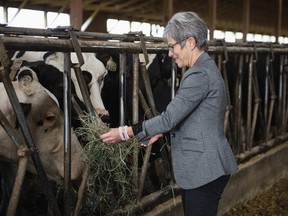No quick fix to B.C. veterinarian shortage, but plan to double vet school grads will help
The Society of B.C. Veterinarians says the province needs about 100 new vets each year to keep up with retirements, a growing population — including more pets and livestock — and changing animal care needs.

Article content
Long drives, longer work days and a long list of patients are the life of B.C.’s rural veterinarians.
An 80-hour work week was the norm for Quinn Gavaga, who sold his vet clinic in Cache Creek two years ago in search of a better work/life balance.
“When I was younger, I could do it,” he said. “But I couldn’t sustain the workload.”
Gavaga and others in the agriculture industry applauded a provincial subsidy announced Thursday to double the number of seats for B.C. students at the Saskatchewan college that trains B.C. veterinarians — from 20 seats to 40 — but warned it’s not a quick fix for a provincewide vet shortage.
The Society of B.C. Veterinarians has been warning of a crisis for several years, predicting B.C. needed about 100 new vets each year to keep up with retirements, a growing population (including more pets and livestock) and changing animal care needs.
With no B.C. vet school, the Western College of Veterinary Medicine in Saskatchewan has been training B.C. vets for five decades, along with students from Saskatchewan, Manitoba and, for many years until it opened its own college, Alberta.
The deficit between the number of new vets needed in B.C. and the 20 or so that graduate each year in Saskatchewan was made up by foreign-trained vets, said Gavaga. But COVID-19 disrupted immigration, making a chronic problem acute.
“Things really spiralled out of control,” he said.

At the same time, federal government regulations aimed at reducing the use of antibiotics on farms began requiring a “client-vet” relationship. Small, remote operations that might have accessed medication on a walk-in basis suddenly required more vet care and time.
“The vet has to know the herd,” said Kevin Boon, general manager of the B.C. Cattlemen’s Association.
Large farm animals can’t be transported to a vet clinic three hours away, requiring rural vets to spend hours on the road. In emergency cases, the long drive can take them away from a fully scheduled day of routine cases — or, if the emergency comes in the middle of the night, away from their homes and families.
“There’s nothing about agriculture that’s nine-to-five” said Boon.
The rancher believes the quickest way to solve the problem, which isn’t unique to B.C., is adding seats in Saskatchewan.
“It’ll be several years before we really see the impacts, but it’s a good first step,” he said.
An economic impact study is underway to determine if B.C., like Alberta, should consider funding and establishing its own college, possibly at the University of Northern B.C.

Society of B.C. Veterinarians executive director Corey Van’t Haaf said the $21.8 million over three years announced by Post-Secondary Education Minister Selina Robinson will subsidize tuition for 20 additional B.C. students, meaning they’ll pay about $11,000 per year instead of $69,000.
Van’t Haaf said the society was “thrilled” to see the government responding to calls from vets, agriculture associations, animal rescues, farmers and pet owners to address the provincial vet shortage.
The issue has impacted all areas of B.C. and both large and small animal vets, she said, with people seeking care for livestock on Vancouver Island and northern B.C. hit the hardest.
“There is simply no access in some regions.”
In cases of non-urgent procedures, a pet owner in the Lower Mainland might wait one or two weeks for an appointment. In the north, it might be six months.
Van’t Haaf said a variety of factors led to B.C.’s current vet shortage, including more people buying pets during COVID. There’s also a more advanced degree of animal medicine available today than in the past.
“My dog had an MRI recently. That would have been unheard of,” she said. “This has all together produced a great stress on the system.”
At Thursday’s news conference announcing the funding, Adrian Walton, owner of Dewdney Animal Hospital in Maple Ridge, said that his family was vacationing without him because he’s the only vet in what should be a four-vet practice.
“I really want to thank the government for extending this funding to provide us with another 40 vets a year,” he said. “I’ve told my wife we can probably plan a vacation in two years.”

In Cache Creek, Gavaga isn’t waiting.
When he realized he no longer liked his job, he scaled back to focus on horses, finding enjoyment in his work again.
“(Vet colleges) select compassionate people who will put in the work because they love it,” he said. “It’s easy to make the case for why we need more vets.”
Support our journalism: Our in-depth journalism is possible thanks to the support of our subscribers. For just $3.50 per week, you can get unlimited, ad-lite access to The Vancouver Sun, The Province, National Post and 13 other Canadian news sites. Support us by subscribing today: The Vancouver Sun | The Province.




![VANCOUVER, BC - April 3, 2024 - West Broadway looking west from tower that is under construction at Broadway and Granville in Vancouver, BC, April 3, 2024. (Arlen Redekop / Postmedia staff photo) (Story by Dan Fumano) [PNG Merlin Archive]](https://smartcdn.gprod.postmedia.digital/vancouversun/wp-content/uploads/2024/04/png0403-tower-construction-8.jpg?quality=90&strip=all&w=232&sig=vUa6zTiEqOd-vi2lQwJAhw)



Postmedia is committed to maintaining a lively but civil forum for discussion. Please keep comments relevant and respectful. Comments may take up to an hour to appear on the site. You will receive an email if there is a reply to your comment, an update to a thread you follow or if a user you follow comments. Visit our Community Guidelines for more information.